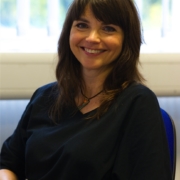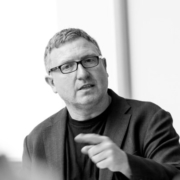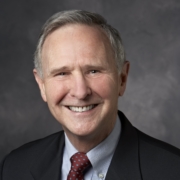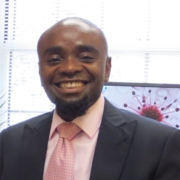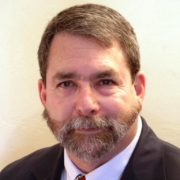Education For All is a global movement led by UNESCO. It began in 1990 when 155 countries adopted the World Declaration on Education For All. The movement was renewed in the year 2000 when countries agreed on the Dakar Framework for Action, which committed them to achieve education for all by the year 2015.
Education For All continues to be a common phrase in educational development. But it has changed over its 26-year existence. It linked into Goals 2 and 3 of the United Nation’s Millennium Development Goals and was tied closely to the World Bank through the funding mechanism known as the Fast Track Initiative.
The movement has adapted and adopted new elements and has included additional actors, such as non-governmental organization, human rights activists, and philanthropic organizations and individuals.
My guest today, Leon Tikly, argues in a forthcoming article in Comparative Education Review that Education For All is best understood as a regime, borrowing an idea from international relations. He says there are “a set of implicit or explicit principles, norms, rules, and decision-making procedures around which actors’ expectations converge.” Of course there are tensions within the regime of education for all, and in this article he attempts to think through what these might be.
Leon Tikly is a professor in the Graduate School of Education at the University of Bristol. His work focuses on education in low income countries and in particular countries of Sub-Saharan Africa. He is known for his theoretical work on how to conceptualize education as an aspect of the postcolonial condition.
His forthcoming Comparative Education Review article is entitled ““The Future of Education for All as a Global Regime of Educational Governance.”
Citation: Tikly, Leon, interview with Will Brehm, FreshEd, 32, podcast audio, June 13, 2016. https://freshedpodcast.com/leontikly/
Will Brehm 0:13
Leon Tikly, welcome to FreshEd.
Leon Tikly 2:09
Thank you very much, Will. It’s a great pleasure to be here.
Will Brehm 2:14
You have a forthcoming journal article in the Comparative Education Review that looks at Education for All. What is Education for All?
Leon Tikly 2:24
Well, I think usually it’s conceived as a movement, a global movement, that has its origins around the Jomtien Conference, Education for All conference. And that really aims to put education for all on the global agenda. I think it’s often seen as a kind of a network, if you like, of actors around a common set of ideas or principles around education for all, that became instantiated in the Dakar Framework. But the way that I see it in this article is really to try and develop that basic understanding, but to see it as a regime, a global regime of educational governance. And it’s that that is the focus of the article.
Will Brehm 3:23
So, before we get into what a regime is, and how you see Education for All as a regime, I’m interested in who are the actors that are in this network that you say that are part of the Education for All (EFA) movement?
Leon Tikly 3:42
Right. Well, that’s a very good question. So, I think at the outset, obviously, UNICEF and the World Bank, and UNESCO played an important role in terms of global institutions. Key donors, as well, from the large Western economies played an important role. But I think also it’s important to acknowledge the role of international NGOs and more grassroots movements as well. And of course, governments. So, including the governments of low-income countries as well as high income countries. But of course, the power and the influence that these different actors had varied.
Will Brehm 4:38
In what way?
Leon Tikly 4:39
Well, I think from inception, if you look back at the history of EFA, I think one can see the influence in particular of the World Bank, for example, in terms of the way that EFA was shaped. As well as UNICEF at the time, and UNESCO. The global institutions had a very powerful influence. I think the global NGOs mobilized and managed to have some kind of influence. And if you look at Karen Mundy and other people’s work, they record this very well. Mario Novelli and Toni Verger’s work also looks at the influence over the years of global civil society. And to some extent, low-income countries had a say, to the extent that they were involved in the discussions. But I think, again, looking at people like Kenneth King and Pauline Rose’s analysis of that time, their voices tended to be subordinate, really, to those of the global institutions.
Will Brehm 6:00
Oftentimes when we hear about EFA, we also hear about the Millennium Development Goals. What’s the connection between these two different ideas?
Leon Tikly 6:13
Well, I think they have different origins. So, they have different genealogies. So, I think EFA emerged at a particular juncture in response to the need to create some sort of coherence around education and aid in the issue area of education aid. But I think the Millennium Development Goals have a slightly different origin, Will, in the sense that they arose from a different global history. Although, of course, what’s interesting is that they have impacted on the same issue area of education.
Will Brehm 7:00
What sort of discourses are embedded in EFA?
Leon Tikly 7:06
Well, I think, one can see broadly two major discourses that I think have shaped EFA. So, I think on the one hand, one can see an instrumentalist kind of discourse, an economistic kind of discourse that has often seen EFA in terms of human capital. And then a more rights-based kind of discourse that has been generally more expansive in its view of what EFA is. And I think both of these discourses are linked to different kinds of epistemic communities. I think the human capital discourse has been developed by intellectuals, researchers, clustered around the global financial institutions in particular. Whilst the rights-based discourse has its origins in the human rights regime, but also has been developed by researchers, intellectuals and others working clustered around UNESCO, for instance, in the global monitoring reports in the case of education, but also by various INGOs and by researchers linked to that, and by the broader research community that’s been informed by more of a rights-based approach. So, two very powerful discourses that have shaped EFA, I think, in often quite contradictory ways. And I think that’s quite important for understanding the way that EFA has evolved in terms of its governing principles and norms.
Will Brehm 8:56
So, EFA on the one hand, is about getting everyone education because education is seen as a human right. And then on the other hand, EFA is about getting everyone education that is defined in the human capital perspective, where it’s very much about future employment that one would get through education.
Leon Tikly 9:26
Yes, yes. And I think broadly, that’s the case, Will. Yes, I would agree with that. I think it’s important to understand that when we label these discourses, if you like, it is a heuristic device. We’re trying to understand, at a general level, how EFA is being shaped discursively. But of course, there are overlaps and the boundaries between these two discourses are permeable, and if that’s reflected at the level of the epistemic communities that are responsible for elaborating these discourses and generating the kinds of evidence and research that goes into the way that these different discourses have evolved. They are again, overlapping communities. It’d be very difficult to find someone in the World Bank, for example, who wasn’t at some level influenced by human rights discourse. Or conversely, if you look at some of the human rights understandings of EFA there’s also a concern with economic goals, as well as more social development goals.
Will Brehm 10:44
And so, what sort of contemporary shifts are you seeing in the EFA movement or perhaps even a regime?
Leon Tikly 10:54
Well, I think what we’re seeing at a very general level is a shift, over the last decade or two decades, away from access as the main focus to learning, and a particular conception of learning. And I think that’s also linked now, of course, in the context of the Sustainable Development Goals to a concept of sustainable development.
Will Brehm 11:34
How is that different from the Millennium Development Goals, for instance?
Leon Tikly 11:39
Well, I think, one can see this at different levels. So, I think, broadly speaking, the Sustainable Development Goals are more expansive, and they are linked more explicitly to these discourses around sustainable development. So, you know, the Millennium Development Goals were very much linked to a view of poverty eradication, or alleviating poverty as a kind of central organizing principle. Whereas the Sustainable Development Goals are linked to, I think, contradictory ideas about what sustainable development is.
Will Brehm 12:26
What makes it contradictory?
Leon Tikly 12:29
Well, I think, on the one hand, again, this goes back to these two major tropes that have traversed the history of EFA: the more economistic understanding, and the more rights-based understanding. So, you have within the more economistic understanding, the people within the World Bank over a number of years now articulating a view of sustainable development that’s really organized around the idea of sustainable and inclusive economic growth. So, again, growth is at the heart, it’s at the center, really, of their interests, their concerns. Whereas in a rights-based approach, it’s a broader, more expansive view of human development which includes a concern with sustainable livelihoods but has a broader focus in terms of an understanding of human wellbeing.
Will Brehm 13:33
So beyond economic growth?
Leon Tikly 13:37
Beyond economic growth. And in the rights-based discourse, you know, going back to the Brundtland Commission, you can see the three pillars, if you like, of sustainable developments, of which sustainable economic development is one pillar. But then, of course, sustainable social development, and then, obviously the whole issue of sustainable environment. So, it leads to a more expansive view, I think, of sustainable development. Not to say that economists don’t take these other issues seriously. I mean, I think the issue of sustainable economic growth and inclusive economic growth includes issues around how to make sure that economic growth involves environmental concerns and also is socially inclusive. But the principle focus in that discourse continues to be this view of economic growth. And I think, in that sense, you could say that not an awful lot has changed in the sense that the underlying view of what economic growth is, and how it’s done, and what makes economies grow, the kinds of policies that make economies grow, in terms of free market, neoliberal kinds of ideas hasn’t fundamentally changed in the World Bank. I think those ideas are still very prominent. And therein, I think, lies a contradiction, a quite a major contradiction, because it’s the effects of untrammeled market growth that I think has had such a devastating effect on the global environment.
Will Brehm 15:27
And so how does the Education for All movement fit into this shifting governance structure that you’re speaking of?
Leon Tikly 15:38
Well, I think, it’s played a very important role in terms of providing a focus. I think it’s been fairly resilient ―as a movement, a discourse, a regime- in terms of providing a way of thinking about education globally, in terms of global education policy that can bring together these different interests, and is compatible at a very general level with these two discourses. So, you know, I think Education for All has a legitimatory purpose. I think it has a legitimatory purpose in the sense that there needs to be some overall coherence in the way that powerful global actors and different kinds of actors come together within a field such as education, and I think it does that. And in doing that, it kind of provides some sort of legitimation for the way that powerful actors work. So, I think it’s been important in that sense. But of course, it hasn’t been immune from these wider contradictions either. And one can see that in the way that EFA has evolved. And in its current stage of development, where I think we’re actually seeing a change in terms of some of its basic underlying principles and norms.
Will Brehm 17:23
Can you go into more detail about that? And maybe provide an example of how you see the change of Education for All over time, and up to this contemporary moment?
Leon Tikly 17:37
Yeah, sure. So, I think within a human capital kind of way of thinking about it, I think there have been shifts there, as we all know, in the way that human capital theory itself has evolved. So, I think, the early emphasis on primary education, for example, has given way to an emphasis now on the knowledge economy and the view that, actually you need to also prioritize different levels of skill in order to develop a knowledge economy. Not just basic education. And also, linked to that, is the view by Hanushek and Woessmann, and other economists linked within a human capital approach that learning rather than years of schooling, is a better predictor of economic growth, which has led to this shift towards learning within a Human Capital Framework. So, I think that’s very powerfully reflected in the way the EFA has emerged and the changes in the priorities that you see. You see, for example, the World Bank, investing more now in higher education, for example, as are some of the other major donors. And you see this emphasis on learning reflected in the World Bank’s Learning for All document. DFID as well, our Department for International Development now talks about learning for all. So, you can see that in the way that learning has become much more of a focus than access. But I think from a rights-based perspective, too, there have been major shifts. So, you can see, if one follows the way that the global monitoring report has evolved over the years, one can see, for example, an increasing emphasis on marginalized groups. So, if one looks back at the Dakar Framework, there’s acknowledgments of, I think, at that time, of different kinds of marginalized groups like girls and women, for example. But I think that kind of analysis has become more nuanced. And it’s become more to the forefront, linked partly to the realization that donor agendas haven’t always targeted the most needy. Whether those be in conflict affected zones or the poorest within countries. So, I think, the changes within both the kind of human capital and human rights framework have led to tangible shifts in policy between Dakar and Muscat and now the SDGs.
Will Brehm 20:37
And those are the conferences that gave rise to the Education for All movement, and then its various changes and iterations over time?
Leon Tikly 20:49
Yeah. So, the Jomtien 1990 conference, the Dakar conference, 2000. And then the recent Muscat conference last year (2015). And these have been important. The world forums have been very important in going back to that idea of EFA having an important role in terms of providing cohesive focus, but also legitimation for the way that different actors working in this area, have been very important. These international conferences have brought together very different kinds of stakeholders.
Will Brehm 21:37
So, in your article, you make the argument that Education for All is a regime. Now, what is a regime? On basic levels, what is a regime?
Leon Tikly 21:48
Well, I mean, it’s defined within international relations as a set of implicit or explicit principles, norms, rules, and decision-making procedures around which actors’ expectations converge. So, at a general level, within international relations discourses, they are global institutions but at a slightly different level from global institutions that we’re more familiar with, like the World Bank, or UNESCO, whatever they might be. They evolve around particular treaties or agreements, frameworks in the case of Education for All within a particular issue area that bring together different kinds of global actors.
Will Brehm 22:56
And so how is the Education for All a global regime of this educational governance?
Leon Tikly 23:05
Well, I think it coheres around a particular set of principles. So, if one looks back over the last 20 years, one can see some consistency at the level of principles. The Global Monitoring Report, for example, has the Six Dakar Goals and I think these have provided a consistent way of evaluating progress towards Education for All and have served as a focal point at the level of principle for the EFA regime. But then one can see at the level of norms, consistency, again, over that period, in terms of how aid effectiveness, for example, is conceived. So, you know, one can see, from the Paris declaration to the more recent Busan Agreement, quite a lot of continuity in the kinds of norms and expectations that govern the behavior of different actors. And also, in terms of the targets. So, if one looks at the actual targets governing EFA, those have also stayed fairly consistent over the last 20 years. Although, I think there have been some quite important shifts, as I’ve mentioned. And then in terms of the rules governing the regime, the rules governing donors and recipients, there’s been consistency. And also, in terms of the decision-making procedures. So, I think, it’s quite a useful way I think of trying to understand how the behavior, the expectations, the actions of important actors have cohered over a given period of time. And a way of understanding how those might change as well.
Will Brehm 25:20
Has power changed? Like the way in which power is wielded, I guess, through these dominant actors. Because Education for All, it’s rarely spoken about in, say, the United States or Japan. It’s always spoken about in developing countries, poor countries, like you said, with marginalized populations. But you’re saying that the regime of Education for All has changed over time. And I just am curious, do you see a change in the way in which power operates?
Leon Tikly 25:58
Yes, I do. And I think here, it’s important to understand how power operates in global governance. And I think the way that we conceive it in international comparative education differs. I think people emphasize different aspects of power. So, I think, within kind of more liberal institutional kinds of discourse, you have a concern with the relative influence of different institutions. The extent to which different governments and different institutions can compel other governments and institutions to do things. Then you have a kind of more Marxist influence or Neo Marxist influence within international comparative education, that has emphasized structural power, the underlying forces or dynamics of global capitalism, the historical tensions between different factions of capital, but also between different classes that provides the ultimate explanation for change and power dynamics. And then, we’ve seen, in the cultural turn over the last 20 years or so, an increasing interest in discourse and discursive power, the way that different kinds of discourses have their own constitutive effects. So, I think, what I’ve tried to do in this article is to draw on more recent understandings of power as involving all of these different kinds of power and how they interact. And I think that’s very important, and I think there are different ways of conceptualizing this, but I think Barnett and Duvall’s typology, I think, for me, provides quite an interesting way of thinking about it.
Will Brehm 28:12
What is that typology?
Leon Tikly 28:14
Well, they talk about four different broad types of powers. So, there’s the institutional power, which is the relative influence that governments have over the major global institutions. So, you know, if you look at the boardrooms of the World Bank or the IMF, or OECD, one can see a dominance of Western industrialized countries and factions of capital linked that are based in those countries. One can see an influence, but a lesser influence of the rising powers. And then a lesser influence still of governments from low-income countries. So, I think the whole idea of institutional power is useful because at a basic level it allows you to see, in practical terms, how different interests are physically represented in these kinds of boardrooms, and so on where decision making is made. But then they talk about compulsory power, which is obviously linked to institutional power, but it’s the extent to which different institutions, different governments can actually compel other institutions and governments to do things. And I think that’s interesting. That’s important in the context of EFA for example, where clearly, the ability of Northern governments to compel Southern governments to adopt a particular kind of economic or education policy is much greater than Southern governments have to compel Northern governments to comply to their commitments and agreements and, for example, the proportion of their GDP that should be committed to aid. So, I think compulsory power is an interesting lens, again, through which to view power. And these two kinds of power are then embedded within kind of wider, more diffuse and, and less tangible kinds of power that I was mentioning before. So, this structural power, the way that global capitalism is organized, means that some regions, some countries of the world are less wealthy than others, fundamentally.
And that within these different regions and countries of the world, you have interests that are more or less powerful based on their position in relation to the global capitalist economy, and how much capital they have, how much influence they’re able to wield financially and so on. And so that has an enormous effect on the ability, the compulsory power, that the different governments, and also the different interests within governments and within countries can have on policy.
But then, of course, there’s discursive power, and this is something I’ve been interested in over a number of years. And others have been deeply interested in ―how, through a Foucauldian perspective, different discourses have their own constitutive effects. So, if one looks at, for example, human capital, human rights discourses we were talking about this morning, they are predominantly Western, in origin. They have their roots fundamentally in the European Enlightenment, and that, I think, has implications now in global governance, to the extent for example, that rising powers, including China, might buy into those kinds of discourses. And they have their own discourses, of course, about development and about education and development that are more linked to their ideas of South-South collaboration and win-win situations and so on. But, of course, these discourses have been very, very powerful. Human capital and rights-based discourses have been extremely powerful in shaping the principles and norms of EFA. So, I think, understanding power multi-dimensionally in that way, I think it’s very important. And I think it’s linked also to, at a more meta theoretical level, to this idea of critical realism, which I think is gaining increasing, kind of, purchase in international comparative education. The idea of multi-causality. The idea that there are different kinds of underlying structures and mechanisms that give rise to different kinds of power. And you have to understand that this complexity that gives shape to something like the EFA.
Will Brehm 33:52
What are your thoughts on the future of Education for All?
Leon Tikly 33:58
Well, I think people still talk about Education for All. I don’t think it’s going to go away quickly as a kind of discourse or a language. But I do think that one can see over the broader term, a shift. And that shift, I think, is more towards learning for all or learning for sustainable development. And I think one can see that in the major discourses of the leading global institutions ―the World Bank, DFID, and so on as we talked about earlier―the way they describe the issue area, now, the way they describe the agenda. It’s so much more in terms of learning for all. One can see it also in terms of the rise in this discourse of sustainable development as a kind of organizing principle or set of principles around which aid and development thinking in different issue areas is expected to cohere. So, I think these kinds of shifts are never absolute. I don’t think we’ve seen a sudden cutoff point just because the SDGs have been adopted, where we now talk about learning or for sustainable development, or education for sustainable development. But I do think that, you know, there is a gradual shift away from Education for all. And I think we’ll see that increasingly.
Will Brehm 35:30
Well, Leon Tikly, thank you very much for joining FreshEd.
Leon Tikly 35:34
It’s an absolute pleasure, Will. Thank you for taking interest in my work. And yes, good luck with your, your project. I think it’s very valuable.
Coming soon!
coming soon!


